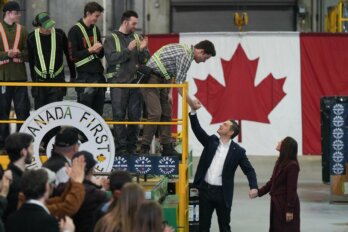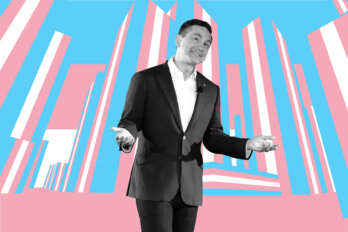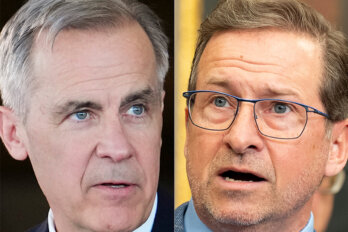[better-know-a-riding]Leading up to yesterday’s federal election, The Walrus followed experienced politicians, new candidates, and a party leader as they interacted with their constituents in ridings across the country and across the political spectrum. Here is how each candidate performed at the polls.
Cumberland–Colchester
Part of the Liberal wave that washed over Nova Scotia, Bill Casey won nearly two-thirds of the vote in Cumberland–Colchester, beating out his former campaign manager, the Conservative incumbent Scott Armstrong. Casey has run as a Progressive Conservative and a Conservative, and he’s served as an independent: he resigned his Tory seat in 2007 after voting against Stephen Harper’s budget. “We said on our sign, ‘Send a message to Stephen Harper,’ and I think the people here have done that,” he told Global News. It’s only the second time a Liberal has held the seat.
Toronto–St. Paul’s and University–Rosedale
All twenty-five Toronto ridings went to the Liberals, the party’s first sweep since 2000. In Toronto–St. Paul’s, NDP candidate Noah Richler failed to make a significant dent in incumbent Carolyn Bennett’s support, winding up with just 8,000 votes. Next door in the newly created riding of University–Rosedale, Chrystia Freeland took nearly 50 percent of the ballots—despite a surprisingly strong showing from the twenty-eight-year-old Conservative Karim Jivraj, who finished third with 18 percent.
Calgary Centre
In one of the closest races in the country, Liberal candidate Kent Hehr beat Joan Crockett, the Conservative incumbent, by just 906 votes. Now, for the first time in almost fifty years, Calgary will send two Liberals to Parliament. Hehr told the Calgary Sun: “I think we’ve seen a tilting of the electorate and a maturing of the electorate, where they can evaluate governments, whether they are delivering on the promises they made and services Canadians expect—and if they’re not, vote them out.”
Northwest Territories
NDP incumbent Dennis Bevington lost his seat to Liberal Michael McLeod after nearly a decade representing Canada’s second-largest riding. “There is one real change that has taken place, though,” Bevington said, despite the loss, “and that is the end of the Stephen Harper government.” Sweeping all three territorial ridings, the Liberals also ousted two Conservative incumbents: environment minister Leona Aglukkaq in Nunavut, and Ryan Leef in Yukon.
Saanich–Gulf Islands
It’s no surprise that Saanich–Gulf Islands re-elected Green Party leader Elizabeth May, who garnered 54 percent of the vote. But overall support for the Greens dipped to 3.5 percent of the popular vote, down nearly half from the 6.8 percent it enjoyed in 2008. In a speech, May blamed the poor showing on the cancellation of the English-language leaders’ debate, and on “the notion that people who wanted to vote Green shouldn’t, couldn’t. That they would be bad people if they did. That’s a hard thing to overcome because it comes from a place we share, which is knowing that it was simply not possible to imagine this country enduring a single second more of Stephen Harper’s policies.”
Peterborough–Kawartha
Toban Leckie of the upstart Strength in Democracy party was always an unlikely contender to win Peterborough–Kawartha, and he finished his first election with just 0.2 percent support. His 134 votes accounted for 1.6 percent of his party’s overall tally (Strength in Democracy lost its only two seats in the House). “I would have preferred to see a minority,” Leckie told the Peterborough Examiner. “But I do feel good that Canadians were of a mind to get rid of Harper.”




